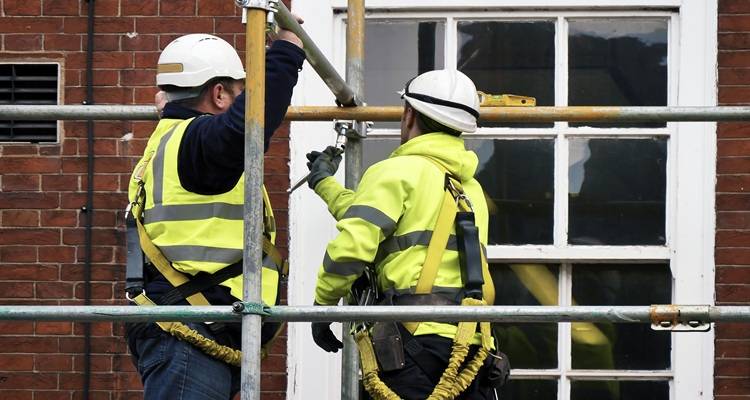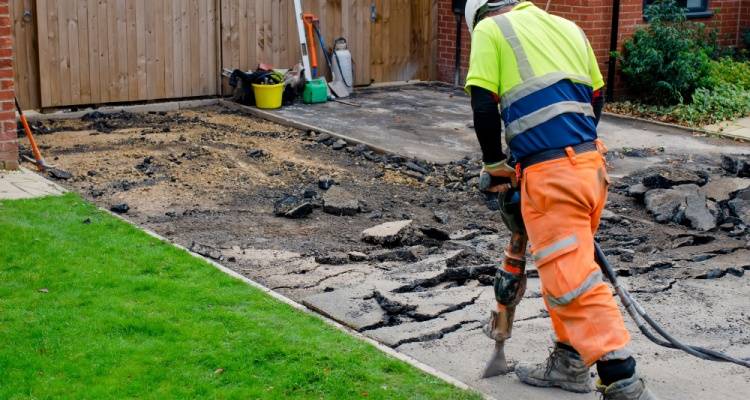How Much Do Scaffolders Make?
Scaffolding is an intrinsic part of construction, providing safe and stable access for trades working at height. Scaffolders are not just seen on new construction sites - they provide essential services to existing buildings to ensure they can be maintained, cleaned, and repaired safely.
So, how much does a scaffolder earn?
The average scaffolder's salary in the UK is £35,000 per year. However, scaffolding pay depends on your experience and qualifications, as well as the location you’re trading in, with higher pay rates being common in London and the surrounding areas. Whether you’re choosing to trade as an employee or as a self-employed contractor will also impact your potential earnings.
This guide will break down the typical scaffolder wage, looking into the factors that affect scaffolding pay rates. We will also dive into scaffolders’ career prospects, whether you’re new to the industry or a scaffolding veteran looking for new avenues of income.
Let’s get started!

Table of Contents
Average Salary of a Scaffolder in the UK
How Much do Scaffolders Make?
The average scaffolder's salary is £35,000 per year.
In the UK, apprentice scaffolders earn around £18,000 per year, and entry-level scaffolders can earn £24,000 per year, rising to £45,000 per year for experienced scaffolders.
If you’re trading as a self-employed scaffolder, you can earn £56,000 per year, but exact earnings are based on your level of demand, skill, and location.
Typically, scaffolders will work between 40 to 50 hours a week between the hours of 8 am to 6 pm.
How Much do Scaffolders Get Paid Per Hour?
The average hourly rate for scaffolders is between £7 and £27 per hour, depending on experience level.
Breakdown of Earnings
Let’s take a look at scaffolder salaries in more detail:
| Level of Experience | Average Hourly Rate | Average Annual Salary |
|---|---|---|
| Apprentice Scaffolder | £7 - £9 | £18,000 |
| Entry-Level Scaffolder | £9 - £12 | £24,000 |
| Qualified Scaffolder | £13 - £17 | £35,000 |
| Experienced Scaffolder | £17 - £21 | £45,000 |
| Self-Employed Scaffolder | £21 - £27 | £56,000 |
Apprentice and trainee scaffolders will start with a low salary of £18,000 per year, gradually increasing in line with qualifications and experience.
A scaffolder’s earnings will rise once you’ve earned industry qualifications, such as the Construction Industry Scaffolders Record Scheme (CISRS). A valid CISRS card is required to work and train on construction sites. This can increase between £6,000 to £17,000 once you’ve reached qualified and experienced scaffolder status.
If you’ve been working for a construction company for a while and want to be self-employed, you’ll be rewarded with a higher annual salary of around £56,000. However, you will have business expenses to pay once you change your business status to a sole trader, which is something to bear in mind, as not all your earnings will be yours to keep.

Regional Salary Differences
Scaffolders were named the third highest-paid UK trade in 2024, according to data from Tradefix Direct. This ranking was below joiners and gas engineers. With an increase in demand for scaffolders in the UK, it’s a good time to join the trade if you’re interested in the industry.
There are regional scaffolder salary differences to be aware of, though. The same Tradefix Direct report said that:
- Scaffolders in Chelmsford earned an average annual salary of £48,199.
- In comparison, scaffolders of the same ability and skill in St. Albans earned an average annual salary of £21,744.
Scaffolder pay will always be higher in London and the southeast, as well as in major cities like Birmingham and Manchester, due to:
- Increased rate of large-scale constructions
- Higher demand for scaffolders
- Higher cost of living (predominately in London and the southeast)
Construction projects in these major cities often span multiple storeys, increasing the need for large-scale scaffolding rigs to enable workers to have safe access to high levels.
In comparison, in rural, remote areas of Wales, Scotland, and northern England, there is a lower cost of living, less populated areas, and a reduced desire for complex, high-rise buildings, especially in the sprawling countryside.
This means work will generally be less consistent for scaffolders in these regions, as their work will be limited to residential projects, which can come and go sporadically, rather than scaffolders in large cities being called in to work consistently on large-scale construction sites.
Let’s take a look at the scaffolder regional salaries in closer detail:
| Location | Estimated Annual Salary |
|---|---|
| London | £38,852 |
| Manchester | £38,224 |
| Birmingham | £28,739 |
| Northern Ireland (Belfast) | £26,471 |
| Wales (Swansea) | £24,973 |
Scaffolders in London can earn around £38,852 a year, those in Manchester being close by at £38,224 per year.
Moving down the country, scaffolders in Birmingham earn an average of £28,739 per year.
Scaffolders working in Belfast, Northern Ireland, receive salaries of £26,471 per year, while those in Swansea, Wales earn closer to £24,973 per year, marking a distinct gap between earnings in populated and less-populated locations.
Factors That Affect Scaffolder Pay
Scaffolder wage depends on various factors:
- Experience and qualifications
- Location
- Employment type
- Industry and specialisation
Let’s look at those in more detail.
Experience and Qualifications
The bottom line: the more experience and qualifications you carry as a scaffolder, the higher your rate of pay will be.

There are a few different routes you can take to become a qualified scaffolder:
- College courses: These include Construction Operations, Scaffolding, and a T Level in Onsite Construction, each with varying completion timelines.
- Apprenticeships: The most suitable is the Scaffolder Level 2 Intermediate Apprenticeship, which can take 2 years to complete.
- Learn on the job: Some companies will take on trainee scaffolders or scaffolding labourers to learn on the job to build up real-world experience. Usually, you will earn qualifications through this process.
When you’re a qualified scaffolder, you’ll earn a Construction Industry Scaffolders Record Scheme (CISRS) card. The CISRS is the UK’s leading scaffolding qualification and demonstrates your knowledge and skill in the trade, ensuring that you meet industry safety and competency requirements.
There are various levels of CISRS cards:
- CISRS Labourer: Labourers who take care of driving and labouring duties on site but don’t erect, alter, or dismantle any scaffolding.
- CISRS BASE (Basic Access System Erector): Non-scaffolders who erect and dismantle basic and routine scaffolding structures.
- CISRS Trainee Scaffolder: Given to individuals training to become a qualified scaffolder.
- CISRS Scaffolder (Tube and Fitting): This is given on completion of CISRS Part 1 and Part 2. Known as a qualified scaffolder, able to lead a scaffold gang in basic operations.
- CISRS Scaffolder (System): This is given on completion of CISRS Part 1 and Part 2. Known as a qualified scaffolder, able to lead a scaffold gang in basic operations using the system scaffold endorsed on the back of the card, but not able to handle tube and fitting structures.
- CISRS Advanced Scaffolder: Given to those who have had a CISRS Scaffolder (Tube and Fitting) card for 1 year. Once advanced scaffolder training is completed, the individual can lead a scaffold gang in all scaffold operations.
- CISRS Basic Scaffold Inspection: Achieved after completion of a 3-day Basic Scaffold Inspection Course.
- CISRS Advanced Scaffold Inspection: A 2-day Advanced Scaffold Inspection training for basic and complex structures for individuals responsible for statutory scaffold inspections.
- CISRS Manager and Supervisor: This training gives the knowledge and management skills needed for contract scaffolding.
The more experienced you are in your CISRS training, the higher your salary is likely to be.
Location
Location plays a big part in determining scaffolder pay. In London, Birmingham, and Manchester, scaffolder salaries are typically higher due to the cities being high-demand areas for complex, high-rise building structures.
This is especially important to consider if you’re thinking of becoming a self-employed scaffolder, as choosing the wrong geographical location as your base can seriously hurt your earning potential if you’re in a remote, rural area with little to no need for scaffolding.
Employment Type
Your employment type as a scaffolder will also play a part in determining your pay. Let’s delve in:
Self-Employed Scaffolder
There is the potential to earn more as a scaffolder in the UK if you switch to work as a self-employed scaffolder. However, this is contingent on:
- Your location: If you’re opting to be self-employed in a rural part of the UK, you won’t see the salary benefits as opposed to a scaffolder in a large city, for instance.
- Your experience: The more experience you have, the higher your rate of pay. It doesn’t make sense to become self-employed until you have a firm standing in the industry and have a reputation behind you.
- Your specialism: If you have experience working on oil refineries, power plants, skyscrapers and complex structures, you’ll typically see higher rates of pay as opposed to domestic housing scaffolders.
Self-employed scaffolders can earn £56,000 per year, but there are some caveats:
- Job security and work might not be frequent, with no guaranteed income.
- You’re responsible for your own tax payments and expenses, with more paperwork than you’d see as an employed scaffolder.
- No sick or holiday pay, and you’ll be responsible for your own pension contributions.
- You’re responsible for your own tools and equipment.
Salaried Scaffolder vs. Contract Scaffolder
As an employed scaffolder, there is also a distinction between full-time positions and contract working.
Contract scaffolders typically get higher rates of pay for daily and weekly work when compared to full-time scaffolders. The work is more flexible, and there is a greater variety in day-to-day operations.
However, as with self-employed work, contract scaffolders don’t have the same job security as full-time scaffolders, and there is no guaranteed work or pay.
On the other hand, full-time scaffolders have a salaried position with a guaranteed rate of pay, including sick leave and holiday pay. Your tools and equipment will be provided by your employer, and having a steady income makes applying for credit and mortgages easier than for those working for themselves or as contractors.
However, salaried scaffolders can perhaps feel limited by their earning potential by being “stuck” in one set position, without the freedom that contract and self-employed scaffolders have.
Industry and Specialisations
There’s no one set path once you’re a scaffolder - you can choose to specialise in a range of industries, such as:
- Domestic scaffolding (such as residential housing)
- High-rise construction (such as skyscrapers and urban city development projects)
- Bridges
- Industrial scaffolding (including oil refineries, shipyards, and power plants)
- Offshore scaffolding (including oil rigs and wind farms)
The more specialised the work, the higher your pay will be as a scaffolder. The pay increases as the risk of the work does, meaning those working in industrial and offshore settings will typically earn more than those working on smaller-scale and residential scaffolding projects.
How to Increase Earnings as a Scaffolder

There are ways to earn more as a scaffolder. Here are some suggestions:
- Work in high-paying areas: Cities where urban development is high, such as London, Birmingham, and Manchester, will give you a higher salary due to the increased demand for complex, high-rise structures.
- Gain additional qualifications: Earning CISRS Advanced or Supervisor/Manager cards can yield higher earning potential due to the increased responsibility you’ll have on-site, for which clients will pay more.
- Become self-employed: If you’ve been working as a salaried scaffolder for a while and want to take things to the next level, becoming a sole trader can boost your earnings - just make sure you operate in an in-demand area, such as London, Birmingham, or Manchester.
- Choose high-paying specialisations: Industrial and offshore scaffolding positions pay more due to the increased risk of the work. While these require extra training, the financial gain can be worth it.
- Work unsociable hours: If you’re happy to work over weekends or to pick up extra overtime shifts, you can earn more as a scaffolder. Overtime rates are typically 1.5x or 2x the standard scaffolder wage.
FAQs
How much does a trainee scaffolder earn?
Can self-employed tradespeople get a fuel card?
This discrepancy in salary is because of the higher cost of living in the capital and increased large-scale construction demand, which boosts earnings.
What’s the average salary of a scaffolder in the UK?
However, these salaries depend on your location in the UK and can increase or decrease based on demand and cost of living factors.
How can scaffolders increase their earnings?
Moving into the self-employed arena is also a good idea to earn more as a scaffolder. However, you will need years of experience and a solid customer base to make this move successfully.
Is there a shortage of scaffolders in the UK?
With the UK government’s Plan for Change aiming to build 1.5 million new homes by 2029, a distinct scaffolder shortage in the UK is causing significant issues, making it a good time to join the industry.








